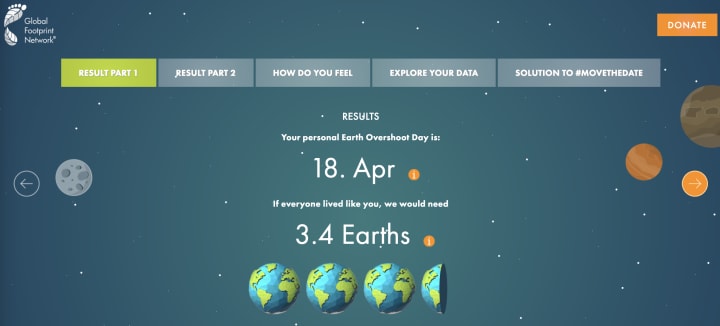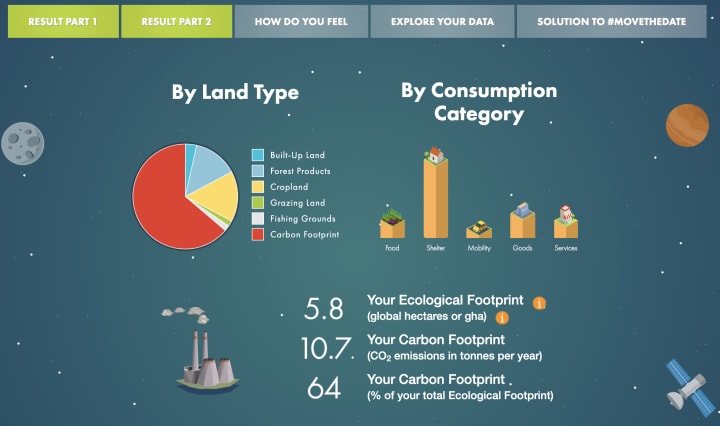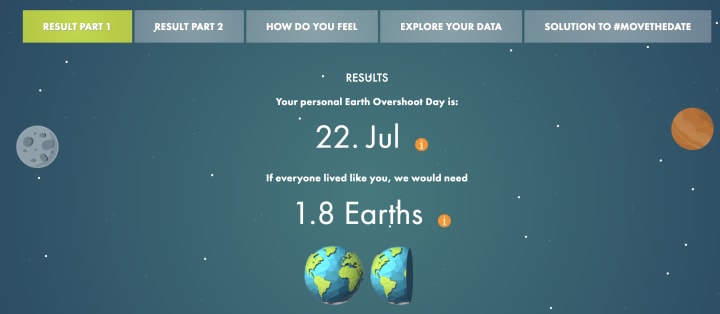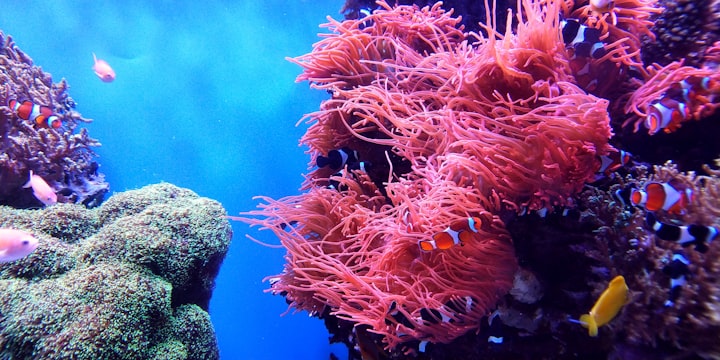April 22nd, officially known as Earth Day. Unofficially known as my birthday to a handful of friends and family, and anyone unfortunate enough to wind up on my Facebook friends list. As a child, I thought it was pretty lame and wondered why I couldn't share a birthday with Britney Spears instead. Now, as an older and only slightly wiser adult, I think it's pretty much one of the coolest days to enter into this spectacular and strange world. Not only that but, I feel like it's basically a flashing neon sign from Mother Earth gently yet firmly telling me to take some responsibility and do my part to try and mend some of the damage done to her. Or at the very least to play my role in reducing the harm that I have unconsciously been inflicting upon her through my daily actions.
The Ocean and I: A Complicated Relationship

When I was younger, my family and I went to the beach every year. I would boogie board and search the waves for sand dollars for hours on end. My parents would have to drag me from the ocean when it was time to go back to the condo. During our trip to Florida one year, I vividly remember we decided to go to the IMAX Theater, where a feature about dolphins was playing. Up to that point, I had never been to an IMAX Theater. I was absolutely awestruck and enchanted. I felt like I was under the ocean with the dolphins. Upon leaving the theater, I had already made up my mind to become a marine biologist. Life never goes exactly the way you've planned, though.
As I grew older, my child-like sense of invincibility began to fade. My amazement and curiosity with these mysterious bodies of water that make up more than 70% of our planet remained unchanged. The fact that only 5% of our oceans have been explored is still a fact that confounds me today. As much as I would love to be a part of exploring the unknown, I watched a few too many episodes of Shark Week somewhere along the way. Either that or as I got older, the voice in my head from my anxiety grew louder and more persistent. Now I prefer to admire the ocean and its wonders from afar.
Except for the bi-annual family beach trips, the only taste of the ocean I get now is from documentaries on Hulu or Netflix. I currently reside in Louisiana and work at a promotional products distributor. In this industry sales representatives from suppliers will visit to show us the latest and greatest hot new items. A lot of suppliers are now offering environmentally friendly products. One sales representative came for a meeting, and when it came time to showcase the eco-friendly options, he stated, "Ah, never mind. Louisiana doesn't care about that." Ouch. Hurtful but also painfully accurate.
I plan to move to Florida later this year, meaning that the ocean will become a more constant part of my life. I don't litter and actively try to pick up others' litter when I see it. That alone, though, is not nearly enough. I may not change everyone else's actions, but I can take personal responsibility for my own. To give thanks to Mother Earth for all that she provides us (and not to let younger me down), I would like to do my part in reducing the harm that I am actively causing to her.
What on Earth Is a Carbon Footprint?

I have an insatiable thirst for knowledge. I just thoroughly enjoy learning new things. My boyfriend makes fun of me often because I Google everything, so much so that he has deemed the act of looking up something mid-conversation as "pulling a Kaitlyn." So in my journey of writing this piece, I wanted to start with three basic questions. What is a carbon footprint, what is my carbon footprint, and where did the term come from?
Simply put, a carbon footprint is how much carbon is released into the air as a direct result of actions by humans. Fossil fuels (e.g., oil, gas, and coal) have carbon in them, and when they are burned, this carbon within is released into the air and becomes carbon dioxide. This extra carbon dioxide in the atmosphere traps heat, making the entire Earth - including the ocean - warmer. Every time you burn fossil fuel, you directly contribute to global warming (albeit on a minuscule scale). Sure, you're only one person, but if even a quarter of the adult population were more conscious of their carbon emissions, that scale wouldn't be so minuscule anymore.
If I intend to reduce my carbon footprint, I obviously need to know my current carbon footprint. Generally, I don't leave my house much outside of going to and from work, located exactly .7 miles from my house. I don't eat meat every day, though I do consume dairy quite often. With those factors in mind, I honestly assumed my carbon footprint wouldn't be too bad. Boy, was I wrong. I used the website www.footprintcalculator.org to calculate mine as it goes very in-depth about these results and what they mean. I'll be inserting screenshots of my results below, as well as my thoughts on them.

To say that I was shocked would be an understatement. First of all, what is Earth Overshoot Day? Well, it means that by April 18th, 2020, if everybody lived like me, we would have used as much energy from nature as Earth can renew in the entire year. We wouldn't even make it to Earth day. In 2020 Earth Overshoot Day was actually August 22nd. 4 months later. Seeing how many Earths we would need to be sustainable if everyone lived like me really drove the point home even further. Though I am doing better than the average for the United States, which is 5.0, that was hardly any solace.

Looking at the second page of my results, most of my carbon footprint comes from my home. The main reason is that I live in Louisiana, and we stink at renewable energy for lack of a better term. Like the aforementioned sales representative said, "Louisiana doesn't care." In 2020 less than 4% of Louisiana's energy came from renewable sources. Compare that to the average of the United States in 2020, which was 20%. Then compare that to California who just hit 95% renewable energy in late April. Amazing. Converting to renewable energy can be done; people need to care! I'm going to be retaking the quiz at the end, factoring in all of the changes I plan to implement in my life including, my move to Florida, to see what those results look like.
"Carbon footprint" wasn't a term I heard in school growing up. So, in my never-ending quest for knowledge, I had to know where it came from. I was shocked to learn the term was coined and popularized by British Petroleum or BP. Yes, that BP, one of the world's largest oil and gas companies. In the early 2000s, they started a campaign effectively blaming individuals for climate change, not oil giants such as themselves. Although they leave a larger carbon footprint than any singular person ever could, in a way, they're right. We can't control the actions of megacorporations, but we can control our own.
The Climate Change Crisis and Our Oceans

Our oceans and the millions of different species of life contained within are in grave peril if something doesn't change and quickly. The majority of the excess heat created by greenhouse gas emissions is absorbed by the ocean, leading to the rising temperature. Along with rising water temperatures, climate change also results in ocean acidification, deoxygenation, and rising sea levels. These factors affect the delicate ecosystems within our oceans, in turn affecting the lives of millions (if not at least a billion) of people who depend on the ocean to survive. It's not just our oceans and the marine life threatened by climate change; it's people too.
Some of you might be saying to yourselves, so what's the big deal if the ocean temperature raises just a little bit? Let's say, for example - there's an increase of 2° Celsius in the water. I wouldn't have thought that a 2°C rise in temperature would make much of a difference either until I watched a documentary called Chasing Coral on Netflix. I learned a lot of crazy things from this visually stunning yet tragic piece. The first being that corals are actually living, breathing animals and not plants as I had previously believed. Corals are actually made up of hundreds to thousands of tiny coral-like creatures called polyps, and each polyp contains microscopic algae. The coral and algae have a symbiotic relationship - with the coral providing the algae with a well-protected environment and the waste products it needs for photosynthesis. In return, the algae provide the coral with oxygen and photosynthesis that the coral needs to build up the reef.

Coral reefs are perhaps one of the most immediately observable victims of climate change. A 2°C rise in the ocean's temperature is all it takes for coral bleaching to occur. Coral bleaching, as the name suggests, is when the water temperature rises. As a response to this stress, the coral polyps expel the algae leaving only ghostly white skeletons. If the temperature of the water doesn't return to normal fast enough, the corals can die. Even if the corals manage to survive the bleaching event, it takes up to ten years for them to fully recover. Due to coral bleaching, we have lost 80-90% of Florida's coral, and in the past 30 years, we have lost 50% of the world's coral.
Coral reefs aren't just beautiful; they are a necessity for animals and humans alike. 25% of ALL marine life relies on coral reefs to survive. Up to an estimated 1 billion people relies on coral reefs as their main source to find food. If that's not reason enough to care, there are also life-saving medicines developed from some types of coral used to combat cancer. The death of our oceans is not only an ecological crisis. It is a humanitarian crisis.

Perhaps an even more imminent and grave threat looms due to the rapidly changing climate - the melting permafrost in the Arctic. This mass melting isn't just an issue confined to the Northern Hemisphere, where permafrost can be found. Not only will it result in people losing their homes, livelihoods, and animals losing their habitats, it will affect climate change around the world. According to Columbia Climate School, "scientists estimate that the world's permafrost holds 1,500 billion tons of carbon, almost double the amount of carbon that is currently in the atmosphere." Though these scientists can't be sure of the exact emission rates that would occur in the event of a large-scale thawing of permafrost, as this has never happened or been a concern in human history...until now. If permafrost continues to thaw at the current pace, it will only serve to exacerbate and accelerate our global warming crisis. I can't put it any more bluntly - the situation that we find ourselves and our beloved Earth and oceans in is nothing less than catastrophic unless we start caring and making some long-overdue changes.
My Pledge to Our Earth and Younger Me

The younger version of myself who had dreams of becoming a marine biologist would be absolutely shattered at the current state of our oceans. Even more than that, she would be immensely disappointed in me if she knew that I was aware of my personal contribution to climate change and wasn't doing anything to change it. The things happening to our oceans and marine life because of global warming due to humanity's need for convenience are appalling. Everyone I know loves to go on vacation to various beaches, so why don't they care about saving them? I owe it to our Earth, all of those magnificent sea creatures, and most of all to myself to take responsibility for my actions and start making some changes. I've decided on five steps that I will personally be taking to reduce my carbon pollution.
1. Venture to Veganism

For as long as I can remember, I've always loved animals and preferred their company over people. One thing you learn growing up in Louisiana - hunting and fishing aren't just hobbies; they're a way of life for some. Though I've lived here for 23 years now, I've never gone hunting. I've never been able to stomach the thought of taking the life of another living thing. I've somehow justified it by telling myself if I'm not the one killing the animal, then it's fine because they would end up on someone else's plate anyway. Almost everyone in my immediate and extended family eats meat. Every family gathering has multiple varieties of meat to choose from. So I've told myself that it would be "too hard" to become a vegetarian, much less a vegan. But as Martin Luther King Jr. once said, "nothing worthwhile is gained without sacrifice."
If my love of animals alone wasn't enough to convince me to switch to Veganism, the effect that the meat and dairy industry (and their notorious mistreatment of animals) has on the environment is. According to the World Wildlife Fund, just the livestock industry alone is responsible for "nearly 15% of all man-made greenhouse gas emissions." While the whole food production process of farm-to-plate totals 30% of all global greenhouse gas emissions. As far as our marine life is concerned, around 85% of fisheries are overfished or fully exploited. Researchers at Oxford University recently found that Veganism is the single biggest way to reduce your environmental impact. By just cutting out meat and dairy, you can reduce your carbon footprint from food up to a whopping 73%!
2. Fighting Food Waste

My mom has tried her best to ingrain not to waste...well, pretty much anything since I was little. I've gotten better over the years, but I still find myself ordering out when there's delicious food at home waiting to be eaten. I'm definitely guilty of ordering food from PostMates or UberEats just because I'm too lazy to put effort into making a meal with the ingredients I already possess.
According to the World Wildlife Fund, about one-third of all the food produced in the world goes to waste. It amounts to enough food to feed all of the starving people on our planet. When you allow food to go bad, you're not only throwing away a meal that could have been eaten by someone who desperately needs it; you're also wasting all of the resources that went into growing, harvesting, packaging, and transporting that food. When you throw away food, it goes to the landfill and rots, producing methane, a greenhouse gas more potent than even carbon dioxide. It's estimated that food waste contributes to 8% of all greenhouse gas emissions.
So how can I personally stop contributing to global food waste? I've always said and been told that my eyes are bigger than my stomach. Which I thought was pretty inconsequential until learning about how much food we produce that goes to waste. That being said, I guess the first step for me would be to be more realistic, and if I do end up overordering to finish those leftovers even if I'm craving something else. In that same vein, I also need to use the food I already have. They even have websites where you can enter some ingredients from your kitchen, and they'll give you recipes! Lastly but maybe the most important - use my freezer. Cooked too much? Freeze the leftovers. Bought too much fruit? Freeze it. These aren't even major life changes that I need to implement, like changing my whole diet. They're honestly pretty simple as long as I stay mindful.
3. Put Down Plastic

After taking an introspective look at myself and my habits, I am definitely guilty of thoughtlessly using plastic. A ton of resources go into the creation process of plastic. Even worse than that, though, almost all of the plastic that has ever been made still exists today. According to Carbon Footprint, if we continue using plastic at the same rate by 2050, there will be more plastic on the planet than fish in the ocean.
As for steps that I'll be taking to reduce my plastic waste, I think the biggest change I can make is refusing it. For example, instead of accepting plastic straws or cutlery at a restaurant, I can carry my own reusable options. Instead of taking plastic cups at drive-thrus, I can request that they use the cup I have brought with me. The second step would be to be more conscientious while shopping. Avoiding food wrapped in plastic and, where possible replacing bathroom bottles with bar options.
4. Recycling

As it stands now, I recycle about 50% of my waste. My neighborhood offers curbside recycling collection, and more than half of my neighborhood doesn't even bother. In 2018 Louisiana's recycling rate was an awful 12.87%, according to Keep Louisiana Beautiful. As for my future home state of Florida, in 2018, their recycling rate was much better at 49%. I vow to recycle everything that I can and convince those around me to do the same.
5. Carbon Offsets

During my research for this piece, I came across a website called Terrapass. Terrapass allows you to calculate your current carbon footprint and then donate through different packages to funding projects that remove carbon emissions. My current lifestyle choices suggest a monthly donation plan that would offset 55,000 lbs of carbon per year. I will be donating in hopes of reducing my harm to our earth and oceans.
The Future Depends on Us

While it's true that I'm just one person, that doesn't mean I'm incapable of making an impact. I will implement the five changes listed above and more to ensure the future of our environment. I can also do my part by informing others close to me of the harm they're causing with their daily routines. I'm one person, but I'm not powerless. We only have one earth so let's make it a good one.
About the Creator
Kat
I have been an avid reader since the age of 6. Creative Writing was always my favorite course. I found this website by chance and figured I would give it a go. When I'm not at work I'm playing with my dog or reading.







Comments
There are no comments for this story
Be the first to respond and start the conversation.